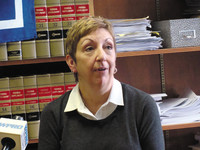This spring, when a level III sex offender moved into the John Brown Francis School neighborhood and a few months later when another offender moved into a Wyman neighborhood, some parents called …
This item is available in full to subscribers.
We have recently launched a new and improved website. To continue reading, you will need to either log into your subscriber account, or purchase a new subscription.
If you are a current print subscriber, you can set up a free website account by clicking here.
Otherwise, click here to view your options for subscribing.
Please log in to continue |
|


This spring, when a level III sex offender moved into the John Brown Francis School neighborhood and a few months later when another offender moved into a Wyman neighborhood, some parents called Representative Joseph McNamara. They thought the offenders were living too close to the schools.
At that time level III sex offenders were prohibited from living within 300 feet of a school. McNamara introduced legislation to increase it to 1,000 feet.
He said this legislation came straight from constituents who were “unsettled” by not only the presence of a level III offender, but their behaviors around the school community.
“The fact that one individual can disrupt a community like that demonstrated to me that there was a need for action,” McNamara said Monday. “I don’t think they belong anywhere near a school.”
Since it’s implementation though, dozens of past offenders have been forced to leave their sometimes long-term residencies to comply, many of them left homeless.
The American Civil Liberties Union (ACLU) submitted a class action lawsuit last Thursday arguing the “unconstitutionality” of the bill and requested a temporary restraining order.
U.S. District Court Judge John J. McConnell granted the temporary stay on the residency law Friday afternoon.
The previous morning the ACLU hosted a press conference with one of the volunteer attorneys, John E. MacDonald, as well as Jim Ryczek, executive director of the Rhode Island Coalition for the Homeless; Jean Johnson, executive director of House of Hope CDC; and Sol Rodriguez, executive director of OpenDoors.
All expressed their concerns that if this law were to stand; not only would it increase the state’s homeless population, but it would also “destabilize” level III offenders and possibly be counter “productive” to public safety.
Ryzcek said that there are three known factors to decreasing recidivism in offenders, stable housing, employment and treatment.
“We have found, not just with offenders, but everyone, that you can’t work on anything in your life without stable housing first,” he said. “Those offenders who have been in a stable position are being uprooted and forced to homeless shelters when there is no evidence out there that says this is helpful at all. It is only increasing barriers.”
With the temporary stay, MacDonald hopes to strike down the legislation as unconstitutional on the basis of its “vagueness”; it doesn’t specify what qualifies as a school, how exactly 1,000 feet should be measured or how to enforce the ruling. This has led to various conclusions from parole officers and departments, all of which seem to be handling the new legislation differently across the state.
Similarly, this new law is subjecting offenders to “banishment” from their current homes.
“It’s creating a new punishment for those who have already been convicted and served their sentences,” MacDonald said.
He said that beyond its illegality, this legislation just “doesn’t make sense” and does anything but increase public safety. Rather, when these offenders are forced out of their housing arrangements; it becomes more difficult for law enforcement to be able to track these men, especially if they are forced into homelessness.
Before the restraining order, Harrington Hall, run by the House of Hope, was the only shelter in the state outside the restricted 1,000 feet, and was thus the only one that could accept level III offenders. The shelter though is already running at capacity, seeing approximately 160 men a night last week with only 120 beds.
Without the stay, 30 more offenders from Providence, who were told to vacate their residences by Nov. 1, were expected to show up to Harrington Hall with nowhere else to go.
“We are the shelter of last resort,” Johnson said. “We can’t continue like this. It’s inhuman to think we are condemning people to the streets, to sleep outside especially after so many of these people have been in stable environments. It’s unfair; these men have served their sentences.”
Harrington Hall has always accepted I, II and III level offenders since the House of Hope took it over in 2009. It has never experienced a problem with these men. Last Wednesday night Harrington Hall saw 44 offenders from all three levels.
Thus, the temporary restraining order was “good news” for House of Hope, but the organization will continue to advocate for the repeal of this law so that “these individuals, especially those who have had long-term housing, can stay in their residencies and live out their lives without further persecution.”
McNamara said, “Although people may say it’s difficult for these offenders and they have served their sentence, I say well what about the children they hurt? Their sentences are a lifetime.”
Few questioned why offenders couldn’t just find alternative housing rather than finding a shelter, but as Ryzcek explained, Rhode Island is a densely populated area, and if you “drew 1,000 feet circles” around schools, you would find there are very few pockets available. Then factor in affordability and the often short notices that had been allotted offenders and you are posed with an “almost impossible task”
McNamara, who admits to having “little to no sympathy” for these offenders, said, “What these individuals have been convicted of are horrendous. With the gravity of their offenses, finding a place to live 1,000 feet away from a school should be the least of their concerns.”
“When convicts are discharged, they have very few options to begin with,” Rodriguez said. “We see them struggling every day. Without an address, these offenders can’t even register.”
This again can pose a danger to public safety because without registering, law enforcement can’t monitor offenders.
Steven Brown, executive director of the local ACLU affiliate, said this is only one reason why this legislation is “counterproductive.”
Similarly, Brown said this legislation affects all level III offenders when a majority of their crimes may not have involved children at all and for those who it does, this only restricts where there name can be on a lease.
“This idea of offenders lingering and hanging around schools is a myth,” Brown said. “This only deals with their residence; these offenders can still go wherever they want throughout the day. This whole thing makes no sense, but it is having a huge adverse affect for no reason.”
3 comments on this item Please log in to comment by clicking here
falina
The only REAL solution is obvious: KEEP them out of society. Forever.
Tuesday, November 3, 2015 Report this
falina
The only REAL solution is obvious: KEEP them out of society. Forever.
Tuesday, November 3, 2015 Report this
Justanidiot
Keep whom out of society for ever? The victims? The offenders? The ACLU?
Wednesday, November 4, 2015 Report this